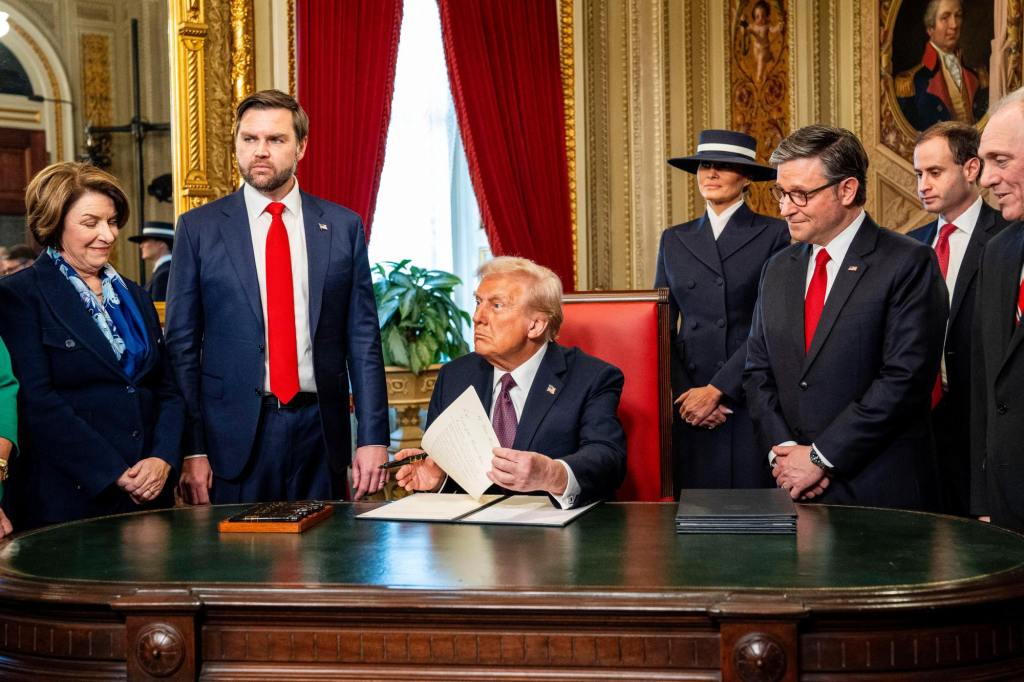
SACRAMENTO – I’ve always enjoyed movies and TV shows about parallel universes, where the protagonists somehow enter another world that looks just like the real one but is fundamentally different and usually quite twisted. Perhaps my favorite of the genre is “The Man in The High Castle,” where the alternative universe is one in which the Nazis triumphed in World War II. It’s a great way to explore ideas and think about history.
Along those lines, let’s say some weird vortex blows in from the, er, Gulf of America and we suddenly find that instead of losing the election, Kamala Harris won a solid victory. Democrats control both houses of Congress and the Supreme Court has a progressive majority. We also find that the Democratic base has a cult-like commitment to the former vice president and the media are acting like lapdogs. It’s preposterous (except for the media part), but we’re talking science fiction.
Instead of governing in the typical misguided way that every presidential administration has operated in the post-war era, President Harris decides to echo the approach of Real World President Donald Trump and govern by edict. Spare me the “whataboutism.” Yes, I know that all presidents have abused their executive-order authority, have defied the Constitution’s clear words and have used the administrative state to advance some dubious ends.
But there’s little question that Trump is taking the concept of the imperial presidency to its apogee. The term refers to the vast expansion of presidential authority—and the process whereby a president uses supposed national-security emergencies to justify far-reaching policies that evade the scrutiny of Congress and the courts. Everyone has done it. George W. Bush used the War on Terror to justify everything. Barack Obama used the financial crisis as an excuse.
But the situation is more perilous in our current dystopian world. First, Trump is more brazen than anyone since FDR in exerting presidential muscle. Second, some in the Trump orbit suggest the courts have no check on the executive branch. Third, the self-appointed defenders of the Constitution (conservatives) no longer are complaining about these power grabs. In the old days (before January 20), they would have publicly decried the actions of elected dictators.
The separation of powers embodies the essence of our Constitution. “The Framers’ experience with the British monarchy informed their belief that concentrating distinct governmental powers in a single entity would subject the nation’s people to arbitrary and oppressive government action,” explains the official congressional website. Former Chief Justice William Rehnquist rightly said “the creation of an independent constitutional court … is probably the most significant contribution the United States has made to the art of government.”
Apparently, this reflects a dying art. While I agree with some of Trump’s stated goals in slashing the federal behemoth, it’s crucial that such efforts—and I do believe most of these current efforts are flashes in the pan or attempts to replace civil servants with MAGA loyalists—follow proper legal procedures. Perhaps Trump’s most blatantly unconstitutional action was his attempted abolition of birthright citizenship. Hint: One cannot change the Constitution by executive order. Fortunately, the courts have so far blocked this dictatorial impulse.
What would conservatives say had Alternative Universe President Harris created new agencies by decree? And what if she threatened to defy court oversight? Toward the end of the Biden administration, the former president and Harris foolishly claimed the Equal Rights Amendment was ratified (it wasn’t). People laughed. But if Harris were in charge, wouldn’t conservatives hope for judicial scrutiny?
Yet Vice President J.D. Vance argued recently on X: “If a judge tried to tell a general how to conduct a military operation, that would be illegal. If a judge tried to command the attorney general in how to use her discretion as a prosecutor, that’s also illegal. Judges aren’t allowed to control the executive’s legitimate power.” Fortunately, Trump just said that he will abide by court rulings but appeal them, so there is some hope for maintaining judicial review.
If he doesn’t stick to that, why not just make the president a king and be done with it? Law professor Ilya Somin puts it more eloquently: “If the president is able to defy or ignore court orders against him, then the executive branch would be effectively free of legal constraints … . It could violate constitutional rights, usurp the authority of Congress (as Trump is trying to do with his wide-ranging assault on the spending power), and more. … (W)e would no longer have a constitutionally constrained federal government, except perhaps in name only.”
One of my oft-repeated maxims: Never support new government powers that you wouldn’t trust in the hands of your enemies. Perhaps Republicans figure Democrats will never win again – and the president continues to toy with running for a third term – but that seems unlikely. In an alternative world where a Harris or Gavin Newsom were president, would you be comfortable with this kind of imperial presidency?
Steven Greenhut is Western region director for the R Street Institute and a member of the Southern California News Group editorial board. Write to him at stevengreenhut@gmail.com.



